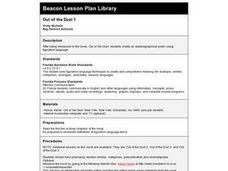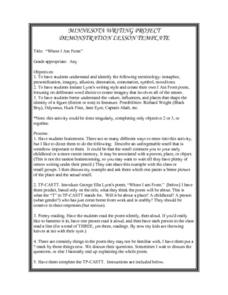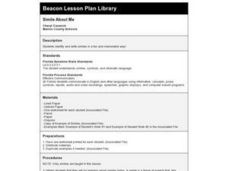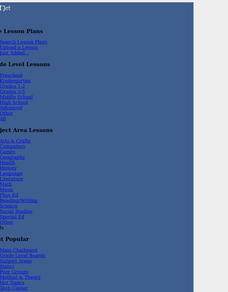Peace Corps
Culture is Like an Iceberg
What influences the way you dress, or celebrate holidays, or connect with your friends? Explore the cultural traits that are not easily seen with an engaging discussion. Using the model of an iceberg, learners place features of culture...
Ohio Department of Education
A Glossary of Literary Terms
If you're tired of defining allusion, onomatopoeia, and satire for your language arts students, hand out a complete list of literary devices to keep the terms straight. Each term includes a definition that is easy to understand and...
Curated OER
Out of the Dust 1
Students review figurative languages terms and examples. They read the first entry in the book, Out of the Dust, and discuss the images created by the author. Then they create an autobiographical poem using figurative language.
Curated OER
Spring Similes
Students write similes with a partner. In this spring similes lesson, students discuss the season an write a story using a minimum number of similes.
Curated OER
Poetry of Abraham Lincoln
Fourth graders analyze Abraham Lincoln's poems "The Bear Hunt" and "My Childhood's Home" for word choice and deeper inquiry into the vocabulary he uses to convey emotion. They identify rhyming words and patterns in these poems. ...
Curated OER
Levels of Organization
Learners read and complete a worksheet about the levels of organization of living things from cells to organ systems. They use a text book and the "Cells R Us" worksheet included to create a metaphor for each of the levels. They then...
Curated OER
Lord of the Flies: Figurative Language
In this Lord of the Flies worksheet, students write whether given examples are simile, metaphor, personification, or hyperbole, and tell how they know.
Curated OER
Identify Poetic Devices
In this poetic devices learning exercise, middle schoolers identify devices being used as alliteration, rhyme, onomatopoeia, rhyme, idiom, simile, metaphor, hyperbole or personification and explain their choice.
Curated OER
Searching for Images in Poetry
Students are introduced to the concepts of similes, metaphors and personification. In groups or individually, they read different poems identifying the similes, metaphors and instances of personification in each. They record all answers...
Curated OER
Figurative Language in Poetry and Prose
Students examine the impact of sound devices in poetry. In this poetry lesson plan, students read the listed poems and identify uses of hyperbole, simile, metaphor, imagery, and personification. Students discuss how sound devices enhance...
Curated OER
Pictures in Words: Poems of Tennyson and Noyes
Students analyze poems by Tennyson and Noyes. They identify examples of alliteration, onomatopoeia, personification, metaphor, and simile. Students create examples of alliteration, onomatopoeia, personification, metaphor, and simile.
Curated OER
KS3 Bitesize
Students complete exercises using their five senses to improve their writing skills. In this writing skills instructional activity, students complete activities blindfolded and using their five senses. Students then select an abstract...
Curated OER
Out of the Dust: Figurative Language
Students find examples of figurative language in "First Rain" in Out of the Dust. In this Out of the Dust lesson, students takes notes on various type of figurative language and identify examples of each type in the poem.
Curated OER
God's Weaving in Taylor's "Huswifery"
Eleventh graders trace Taylor's use of conceit or extended metaphor in his poem "Huswifery" where he compares the process of cloth making to God's salvation of man, and write a poem in which they compare a personal transformation with an...
Curated OER
Poetry: What's on Your Plate (Part 2)
Students write a short paragraph using strong descriptions. In this using modifiers lesson, students define modifier, adjective, adverb, metaphor, and simile. Students then write a journal entry in which they write about a...
Curated OER
Awesome Alliterations
Learners review examples of alliteration in Shel Silverstein's poems. They are assigned a letter of the alphabet and then write an original alliterative poem using that letter.
Curated OER
I Know Why the Caged Bird Sings
Students use Maya Angelou's novel, I Know Why the Caged Bird Sings to identify themes about adversity in the text. In this adversity, students read chapter 36 of the novel and discuss the examples of adversity in the book. Students...
Curated OER
Where I Am From
Students study selected poetry to gain an understanding of influences on values and personal identity. They explore language terms such as personification, imagery metaphors and allusion. After reading a poem and discussing it,...
Curated OER
Simile About Me
Learners are introduced to similes and read various examples. Then students write their own similes to describe themselves and share them with the rest of the class.
Curated OER
Ode to a Nightingale
Students read poems about Tuberculosis by John Keats. Using the poems, they identify similies, metaphors, personification and imagery. In groups, they make connections about the author's outlook on life and how his disease impacted his...
Curated OER
From Ordinary To Extraordinary Writing
Students investigate the quality of writing while focusing on the use of sensory words to convey meaning and ideas. The power of similes and metaphors is emphasized while they create and edit works of writing. The skill of descriptive...
Curated OER
Figurative Language
Twelfth graders examine personification and alliteration in various reading selections. They read magazine articles, brochures, and advertisements, identify the examples of personification and alliteration, and create a business name...
Curated OER
Reading and Study Guide: Julius Caesar Act I
In this reading and study guide students define vocabulary and literary terms from Act I of Julius Caesar. Students give examples of literary terms found in the reading and answer comprehension questions.
Curated OER
Figurative Language Scavenger Hunt
Eighth graders analyze and interpret figurative language. They listen to some examples of poetry which use figurative language. Then, they divide into groups and attempt to find more examples. Finally, 8th graders write what the poet is...

























